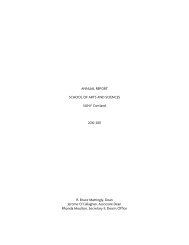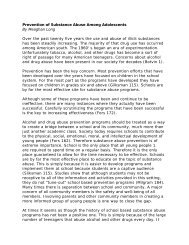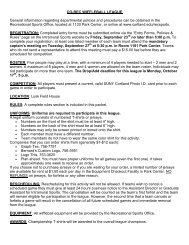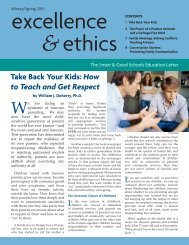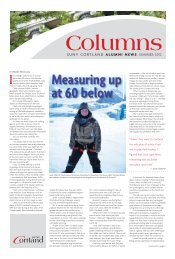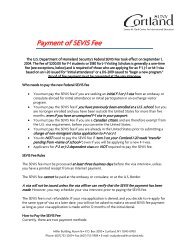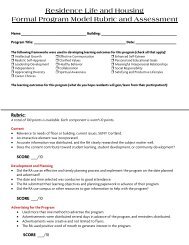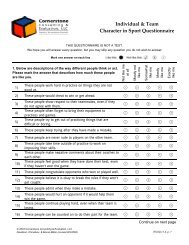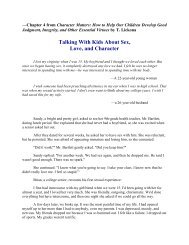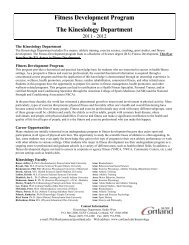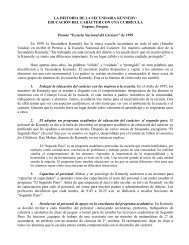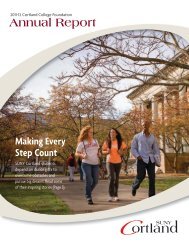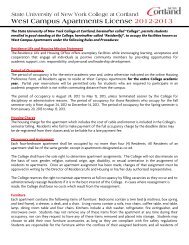ACADEMIC ADVISEMENT MANUAL - SUNY Cortland
ACADEMIC ADVISEMENT MANUAL - SUNY Cortland
ACADEMIC ADVISEMENT MANUAL - SUNY Cortland
- No tags were found...
Create successful ePaper yourself
Turn your PDF publications into a flip-book with our unique Google optimized e-Paper software.
“Modest” clothing covers the torso and shoulders. Tank tops, sleeveless tops, crop tops,and very short shorts would not meet this criterion.“Unrestricted and safe movement” means that clothing should neither be so loose or sotight that interferes with participation or clarity of demonstration. Clothing that does notfit properly may lead to injury (e.g. warm-up pants too long, cargo shorts too baggy, loosejewelry).Courses with Teaching LabsTeacher candidates are preparing for a field where dress is relatively conservative and they shoulddress accordingly in their role as pre-service teachers. When teaching labs in physical educationclasses, collared shirts with shorts or slacks (e.g. golf type or Dockers) or a professional-looking warmupare considered appropriate. Clothing should fit comfortably to allow for movement anddemonstrations. Clothing should be clean and neat in appearance. Logos or printing on clothingshould not be distracting and any message in the print should be suitable for children. Sweat pants,street shoes, jeans, cut-off shorts, and T-shirts are not appropriate for teaching.Field Experiences:Field experiences are a critical component of your professional preparation. You will have multipleopportunities to practice your teaching skills with diverse groups of students. Some of theseexperiences may require you to travel some distance from the College and you may need to provideyour own transportation to these sites.During your field experiences, you must exhibit the highest levels of professionalism. Yourcommunication, professional behaviors (including grooming and dress), and ability to maintainprofessional boundaries will be closely scrutinized.Professional boundaries are the lines you do not cross while in the role of a teacher. You mustmaintain some professional distance with students – they cannot be your friends. While involved infield experiences, you should NOT: Allow students to call you by your first name Phone, text, or email students Engage in social media with students (unless required for a class). Do NOT “friend” studentson Facebook. Hold individual meetings behind closed doors with students Hold meetings with students outside of the school day Interact with students in a personal or romantic manner (flirting and any inappropriatesuggestive behavior toward any student is off limits) School computers are only to be used for professional purposesIf you need to contact students outside of school, consult your host teacher and communicate withthe parents instead of the student.ALWAYS REMEMBER, your behavior is a reflection on you, our department, and the College.Technology Policy: Technology issues: Problems with technology are not an acceptable excuse for latesubmission of your assignments. You MUST assume that technology will fail you at somepoint. You cannot and should not assume that everything will go smoothly when it comes to24



